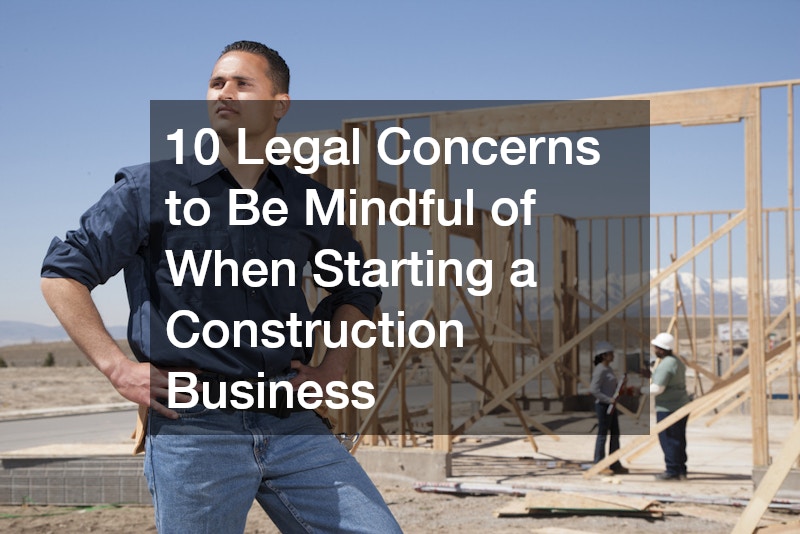Starting a construction business is an exciting yet complex venture that goes beyond creating blueprints and building structures. Entrepreneurs in the construction industry must navigate a myriad of legal concerns to protect their business, employees, and clients. Failure to address these issues can lead to costly penalties, disputes, or even business closure. This article delves into ten critical legal concerns every aspiring construction business owner must address to ensure compliance, minimize risks, and lay a solid foundation for success.
1. What Are the Licensing Requirements for a Construction Business?
Obtaining the proper licenses is one of the most critical steps in starting a construction business. Licensing ensures that contractors meet the professional standards and regulatory requirements of their region.
A. Understanding Local and State Licensing Laws
Licensing requirements vary by state and municipality. For example, some states require separate licenses for general contractors, electricians, and plumbers, while others combine these into a single classification. Consulting with a business attorney who understands local laws is essential to navigate these complexities.
B. Process for Obtaining Necessary Permits
In addition to licensing, securing permits for individual projects is crucial. Failing to obtain the proper permits can result in fines, work stoppages, or legal actions.
C. Common Mistakes in Licensing Applications
Incomplete applications or missing documents are common errors. Partnering with a knowledgeable legal or administrative team can help streamline this process.
D. Renewals and Continuing Education for Contractors
Many jurisdictions require periodic license renewals and continuing education to stay updated on industry changes, including updates on fall protection training or OSHA standards.
E. Penalties for Non-Compliance
Operating without the necessary licenses can lead to hefty fines, revoked permits, or even criminal charges. Being proactive in meeting licensing requirements ensures a smooth start for your business. For example, if operating a crane, maintaining a regular crane inspection can help you avoid fines.
2. How Can I Protect My Business with Construction Contracts?
Clear and enforceable contracts are essential for defining the scope of work, deadlines, and payment terms in construction projects.
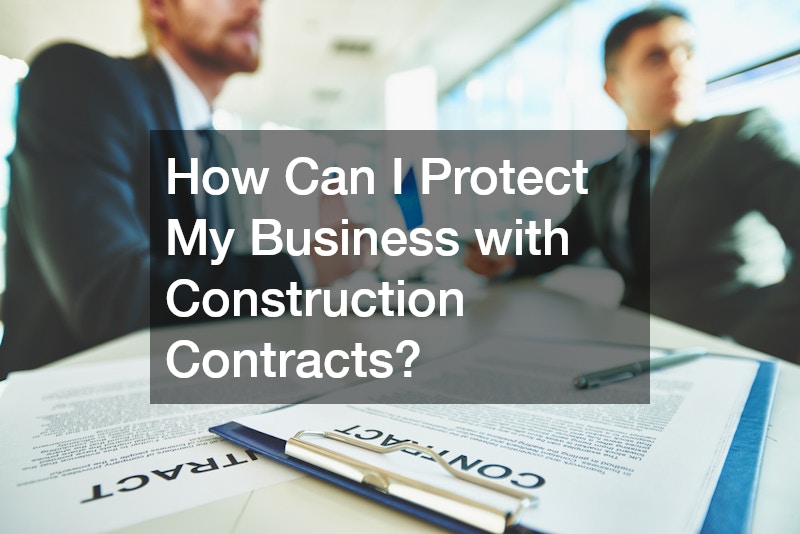
A. Key Clauses to Include in Construction Contracts
Ensure your contracts address timelines, warranties, indemnities, and dispute resolution mechanisms. A workers comp lawyer can help include clauses that protect you in case of on-site injuries.
B. Customizing Contracts for Different Projects
No two projects are alike. Tailoring contracts to reflect the specific details of each project minimizes ambiguity and potential disputes.
C. Dispute Resolution Options
Include mediation or arbitration clauses to provide an alternative to costly litigation in case of disagreements.
D. Aligning Contracts with Client Expectations
Contracts should be clear and specific about deliverables, timelines, and costs to manage client expectations effectively.
E. Legal Recourse for Breach of Contract
Understanding your legal rights when a client or subcontractor breaches a contract can save time and money. Always consult with a lawyer before taking action.
3. What Are the Insurance Needs for a Construction Business?
Insurance is a cornerstone of risk management in construction. Being underinsured can expose your business to significant liabilities.
A. Types of Insurance Coverage
Essential policies include general liability insurance, workers’ compensation, professional liability, and builder’s risk insurance.
B. Evaluating Your Construction Risk Profile
Factors like the size of your projects, use of used concrete equipment, and employee count impact your insurance needs.
C. Selecting an Insurance Provider
Choose a provider with experience in the construction industry who can tailor coverage to your specific needs.
D. Insurance Claims Process
Streamlining the claims process is crucial to minimize downtime after accidents or property damage.
E. Legal Implications of Being Underinsured
Operating without sufficient coverage could result in lawsuits and personal liability, jeopardizing your business.
4. How Do Zoning Laws Affect Construction Business Operations?
Zoning laws are a crucial consideration for any construction business. These regulations determine how land can be used in specific areas, affecting the type, size, and location of construction projects. Ignoring or misunderstanding zoning laws can lead to severe penalties, costly delays, and even project cancellations. As a construction business owner, it is essential to fully understand and comply with these regulations to ensure smooth operations and avoid unnecessary complications.
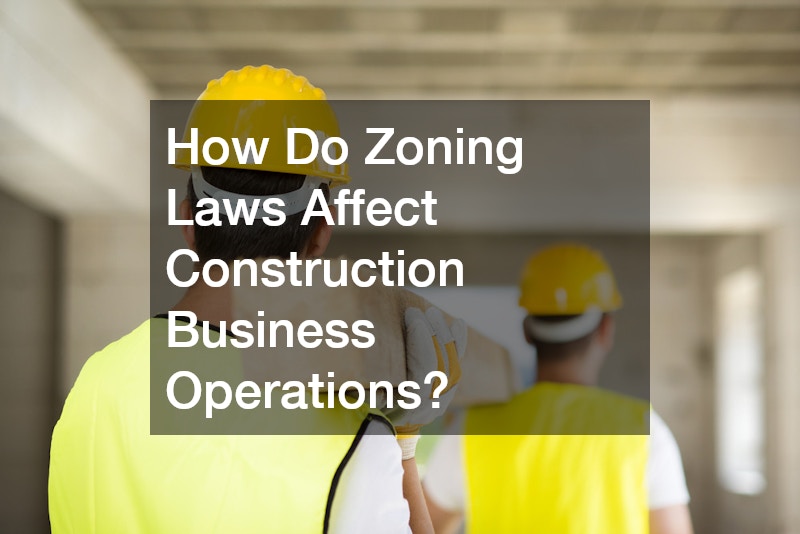
A. Navigating Zoning Regulations
Zoning regulations vary significantly depending on the location, with each municipality or city having its own set of rules governing land use. These laws divide areas into zones such as residential, commercial, industrial, or mixed-use, specifying the kinds of structures that can be built and their intended purpose. For example, a project involving a deck builder may be permissible in a residential area but requires additional approvals if the deck encroaches on setback lines or easements.
Understanding the intricacies of zoning regulations requires detailed research and, in some cases, consultation with a business attorney who specializes in local land-use laws to avoid legal concerns. Some areas may have overlapping or conflicting regulations, such as historical preservation rules that impose additional restrictions. Being well-versed in these nuances can save your business from unnecessary legal hurdles.
B. Impact of Zoning Changes on Projects
Zoning laws are not static; they can change based on community needs, political decisions, or environmental considerations. A project approved under current zoning regulations could face complications if the zoning laws change before construction begins. For example, a commercial project may no longer be permissible in an area rezoned for residential use.
The implications of zoning changes can be significant, potentially halting your operations or requiring substantial modifications to your plans. Regularly monitoring local government decisions and proposed zoning changes is essential. Staying proactive in tracking these updates can help you anticipate potential challenges and adjust your project timelines and budgets accordingly.
C. Legal Pathways to Zoning Variance
In some cases, your project might not align perfectly with existing zoning laws. For example, you may want to build a structure closer to the property line than allowed or construct a mixed-use development in an area zoned exclusively for residential use. In such situations, seeking a zoning variance is often the best solution.
The process for obtaining a variance typically involves submitting a formal application to the local zoning board, presenting your case during a public hearing, and addressing any concerns raised by the community. Working with a lawyer experienced in zoning law can significantly improve your chances of success. They can help you prepare a compelling argument, ensuring that your request complies with local regulations and demonstrates minimal impact on the community.
D. Community Involvement and Zoning Decisions
Community involvement plays a significant role in zoning decisions. Residents and local organizations often have the opportunity to voice their opinions on proposed projects during public hearings. Opposition from the community can delay or even derail a project, making it crucial to address their concerns proactively.
Engaging with the community early in the project planning process can help build trust and gain support. Hosting informational meetings, sharing detailed plans, and explaining the benefits of your project are effective ways to foster goodwill. For example, if your project involves used concrete equipment, highlighting its eco-friendly benefits and safety measures can help alleviate community concerns about noise, pollution, or disruptions.
E. Consequences of Zoning Violations
Zoning violations can have severe consequences, ranging from fines and legal action to mandatory project modifications or demolitions. Non-compliance can also damage your reputation, making it harder to secure future permits or win client trust. For instance, constructing a building without the necessary zoning approvals could result in an order to halt work or dismantle completed sections.
The financial impact of zoning violations can be significant. In addition to fines, you may face increased costs for rework, legal fees, and delays. Consulting with a business attorney before starting any project is crucial to ensure compliance with all zoning requirements. Additionally, maintaining clear and organized records of permits and approvals can serve as evidence of due diligence in case of disputes or inspections.
5. What Employment Laws Must Be Followed in the Construction Industry?
Construction employers must adhere to numerous labor laws to ensure the safety and fair treatment of their workers.
A. Labor Standards and Wage Laws
Ensure compliance with federal and state wage laws, including overtime and minimum wage requirements.
B. Health and Safety Regulations (OSHA)
Providing training, such as fall protection training, is not just a best practice but often a legal mandate.
C. Hiring Practices and Discrimination Laws
Avoid discriminatory practices during hiring and employment to prevent lawsuits.
D. Employee Contracts and Worker Classification
Properly classify workers as employees or an independent home contractor to avoid tax and legal complications.
E. Handling Workplace Disputes Legally
Establish clear grievance mechanisms and consult with a workers comp lawyer when disputes involve workplace injuries.
6. How Do Environmental Laws Affect Construction Projects?
Construction activities can significantly impact the environment, making compliance with environmental regulations essential for avoiding legal concerns.
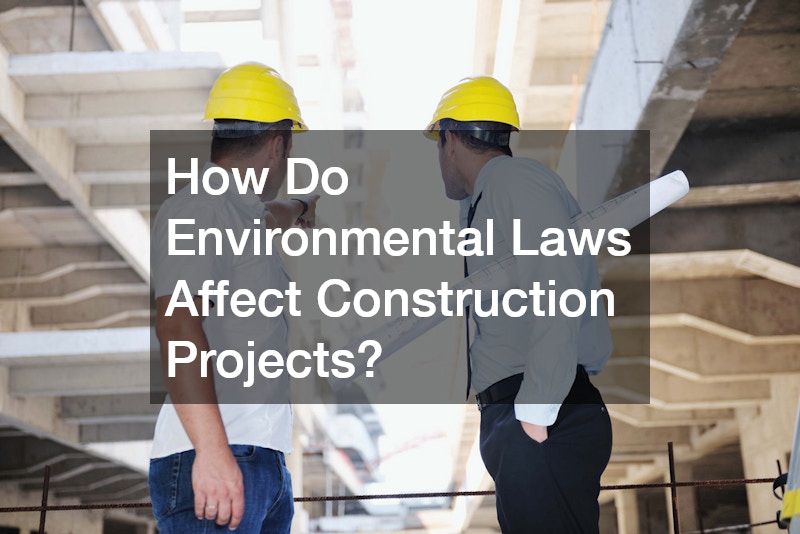
A. Understanding Environmental Impact Assessments
Before starting projects, assess environmental risks and create mitigation plans to comply with legal standards to avoid legal concerns.
B. Compliance with Clean Air and Water Acts
Construction sites must adhere to federal laws governing pollution and waste disposal.
C. Managing Hazardous Waste on Construction Sites
Failure to dispose of hazardous materials properly can lead to severe penalties.
D. Green Building Codes and Certifications
Meeting green building standards not only enhances your reputation but also ensures compliance with newer legal requirements.
E. Legal Actions for Non-Compliance with Environmental Laws
Ignoring these legal concerns can result in lawsuits, fines, or project shutdowns. Consult with an accident lawyer if environmental hazards result in injuries or claims.
7. Are There Intellectual Property Concerns in Construction?
Intellectual property (IP) is an often overlooked legal aspect of construction but can be crucial for innovative businesses.
A. Patents for Construction Methods and Materials
If you develop unique building methods or materials, consider patenting them to protect your competitive edge.
B. Protecting Architectural Designs
Copyright laws safeguard original designs from unauthorized use.
C. Trademarking Your Construction Company’s Brand
A strong trademark distinguishes your company and prevents brand infringement.
D. Handling Intellectual Property Disputes
Disputes over IP can be costly. Proactively securing rights and consulting a lawyer minimizes risks.
E. Licensing Agreements for Technology Use
Using licensed software or technology ensures compliance and avoids potential lawsuits.
8. What Legal Considerations Exist for Utilizing Subcontractors?
Subcontractors play a critical role in construction projects, but managing them comes with legal obligations that can quickly become legal concerns.
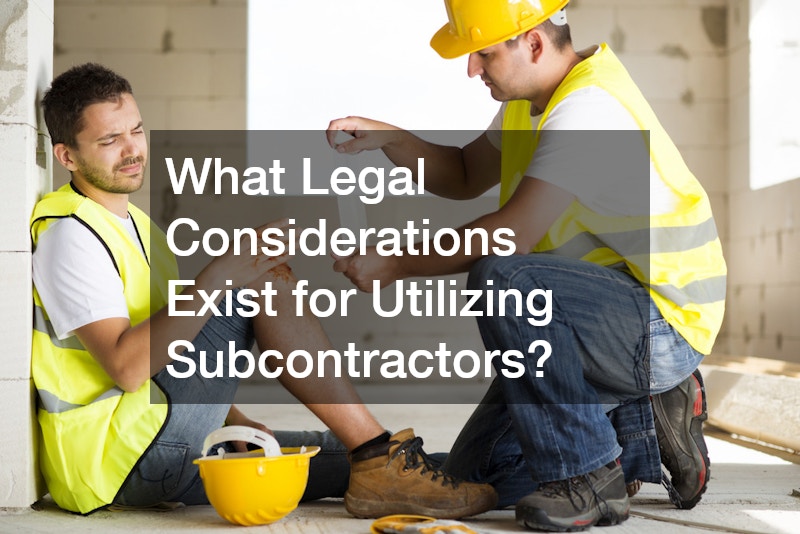
A. Drafting Effective Subcontractor Agreements
Include clear terms for scope, payment, and dispute resolution in your agreements.
B. Ensuring Subcontractor Compliance with Laws
Verify that subcontractors meet legal standards, including licensing and insurance requirements to avoid legal concerns.
C. Legal Liabilities When Subcontractors Breach Agreements
Your business may be held liable for a subcontractor’s negligence or non-compliance.
D. Managing Subcontractor Payments and Liens
Avoid payment disputes by ensuring transparent billing practices.
E. Establishing Quality Control Protocols with Subcontractors
Clearly outline expectations to avoid quality issues that could lead to disputes.
9. How Do Construction Bonds Work?
Construction bonds provide financial security, demonstrate your reliability to clients and help to avoid legal concerns.
A. Types of Construction Bonds
Bid, performance, and payment bonds are the most common types required in the industry.
B. Benefits of Bonding for Construction Projects
Bonds protect both the client and contractor by ensuring project completion.
C. Process of Securing a Construction Bond
Work with a qualified broker to secure bonds and comply with state regulations.
D. Legal Consequences of Bond Claims
Failing to meet bond requirements can lead to lawsuits and project delays.
E. Cost Implications of Bonds for New Businesses
Though bonds can be costly, they are often necessary to win contracts and build credibility.
10. How Should Disputes with Clients or Subcontractors Be Handled?
Disputes are inevitable in construction, making effective resolution strategies essential.
A. Methods for Dispute Resolution
Options like mediation, arbitration, or litigation can resolve disputes.
B. Preparing for Litigation and Court Procedures
Consult with an accident lawyer or litigation expert if a dispute escalates to court.
C. Documentation as Legal Evidence
Keep detailed records of contracts, communications, and project milestones to strengthen your case.
D. Mediation vs. Arbitration
Mediation offers a non-binding resolution, while arbitration results in binding decisions.
E. Cost-Effective Solutions for Dispute Management
Invest in legal counsel to find efficient ways to resolve disputes without harming your business relationships.
Starting a construction business involves navigating a complex web of legal concerns, from licensing and contracts to insurance and employment laws. Addressing these issues proactively, with the help of professionals like lawyers or a business attorney, ensures compliance and reduces risk. By staying informed, implementing best practices, and seeking expert advice, you can build a construction business that is not only legally sound but also poised for long-term success.

